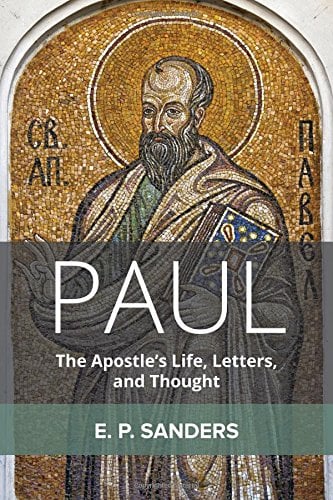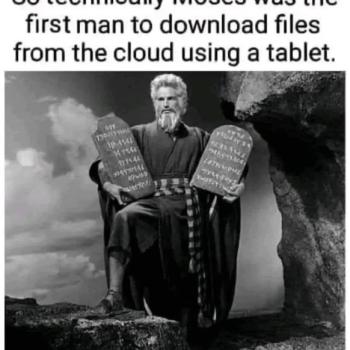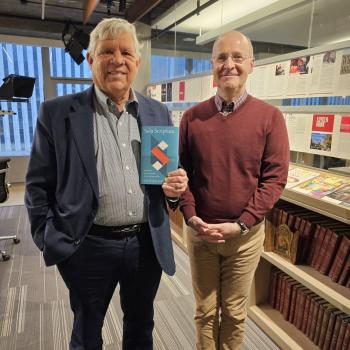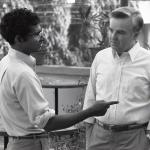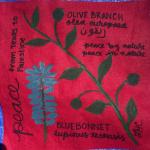p. 309— Paul’s version of the words of institution are closer to Luke’s version than to Mt. and Mk. In Luke and Paul, Jesus ‘gives thanks’ before breaking the bread; and after mentioning his body he says ‘for you’, and Paul and Luke both have ‘in remembrance of me’ Luke once and Paul mentions it twice, and in Paul and Luke the cup is the ‘new covenant in my blood’, rather than ‘my blood of the covenant’ as in Mark and Matthew. The common core with the Synoptics and Paul is a loaf of bread identified as his body, a cup with a saying about covenant and blood, and a statement about the future.
[Note that Sanders doesn’t even entertain the possibility that Luke was a sometime companion of Paul and that Paul got his info about the sayings and story of Jesus partially from Luke. This of course would mess up his contention that the early parts of Acts are Lukan fabrication when it comes to Saul being a Jerusalemite]
p. 310– Sanders notes that ‘this is my body’ in 1 Cor. 11 precedes the discussion about the body of Christ in 1 Cor. 12, and the ‘members of Christ’ is mentioned in 1 Cor. 6 about the prostitutes and then discussed in 1 Cor. 12, moreover the notion of Christ’s body and sharing one loaf of bread comes up again in the discussion about idol food in 1 Cor. 8,10. But the emphasis in the L.S. tradition is that it is a memorial meal and that it is done until he comes.
p. 311– In regard to idol meat, probably Paul had told them that there was only one God, and in 1 Cor. 8.1-4 the Corinthians realized they need to provide a rationale for continuing to go to idol feasts, so they quoted Paul back to him.
p.312— There were great social benefits to participating in the city’s pagan customs, [indeed it was one of the means of getting ahead in life in that society]. Most days pagans diet was barley, bread, cheese, fish, wine. But with the festivals they got plenty of red meat, because the gods only got a few bones, and the celebrants got the lion’s share of the meat, this was the occasion for people to have red meat, otherwise a rarity. [If it was such a rarity why talk about the buying of it in the meat market in 1 Cor 10?].
p. 313- Paul’s first concern is for the weak whose conscience’s will be defiled if they eat idol meat. In effect, he brings the issue under the heading that the strong should love thy neighbor and not lead them to violate their conscience. Exod. 20.5; Deut. 5.9 tells Jews not to bow down to idols or worship them, but Paul does not cite this in his discussion here.
p. 314—“Paul seems to be unwilling to cite the commandments on the first table as laws that govern his churches, in fact one of them, observance of the Sabbath he felt ambiguous about (see Gal. 4.10; Rom. 14.5-6). He had no such feelings about idolatry, which is also covered by ‘the first table’—he was against it…. Though he does not quote Lev. 19.18 in this passage, he elsewhere cites it as a summary of the law (Gal. 5.14; Rom. 13.8-10), and the principle ‘love thy neighbor’ guides his discussion of food offered to idols in 1 Corinthians 8.”
p. 315—In 1 Cor. 10.6-13 we find Paul using a form of Jewish argumentation that will leave most of his gentile readers puzzled. 1 Cor. 10.6-13 is a typological argument. The word type shows up in vss. 6 and 11. He is using the word type in the sense of prototype. Paul’s point is the consequences that happened then will be repeated if you (Corinthians) repeat the actions of Moses in his day. Paul is an expert in the LXX and in argumentation based on it.
pp. 316-17— Paul’s conclusion is— having nothing to do with idols, long ago it proved fatal to many Israelites. In these verses Paul again writes as if to Jews (‘our ancestors were under the cloud’). The particulars he mentions are from Exod. 13,14,16,17 and Num. 20. The cloud is from Exod. 13.21, passed through the sea is Exod. 14.22, spiritual food of manna is Exod. 16.4-15, the rock yielding water is from Exod. 17.6 and Num. 20.2-12. As for differences Exodus does not say they were baptized into Moses in the cloud and sea, secondly Exodus does not call the manna and the water spiritual food and drink that’s Paul interpretation, and the water giving rock was stationary not mobile as Paul says. Obviously ‘the rock was Christ’ is Paul’s addition and indicates an early belief in Christ’s pre-existence.
p. 318—the quote about sitting down and rising up to dance in 10.7 is from Exod. 32.6. The people feasted and then danced, or played, or reveled. Whatever they did was part of the worship of the golden calf.
p. 319 Paul says that what was written back then, was written for us (ie for our benefit). Sanders says we should doubt the Corinthians follows this argument. For one thing, Paul doesn’t mention the golden calf, though he does make the admonition don’t become idolaters (10.7). [Sanders seems to make the mistake of assuming there were NO knowledgable Jews in Paul’s congregations, but we know that quite specifically to be false in Corinth. In fact he had converted a synagogue ruler or two in Corinth—- Stephanus for example. So his imagining that they would have to go scrambling after scrolls to figure this out is sheer fantasy.] He adds that the Numbers passage is not related to idolatry but to the desire for food (Num. 11.4) and it was satisfied by the quail, not by sacrifice (Num. 11.31). And in Numbers, struck down has nothing to do with punishment for idolatry. Paul’s conclusions are clear his argument convoluted.
p. 320– “So Paul has combined two stories— from Exodus, the story of the golden calf, and from Numbers the story of the people’s grumbling which led God to kill some of them and frustrate the rest” i.e. not allowed to enter promised land.
p. 321— the phrase destroyed by the Destroyer in 1 Cor. 10.7 comes from Wis. Sol. 18.25 which Sanders thinks is late first century B.C. in composition. Here Paul is drawing lessons from Num. 25, 21.5-6 (the snakes), and 16.
p. 322— “That is, Paul apparently has in mind Num. 16.41-50 as it was retold in Jewish syngoagues” (on the close relation between Paul and Wis. Sol. see pp. 352-55 below). Sanders points to Manfred Brauch, “The Problem of the Dual Pauline Eschatology in Light of the Eschatology of the Wisdom of Solomon” McMaster PhD 1972. Sanders thinks Paul may have got this from listening to synagogue sermons, perhaps in his youth, or maybe he knew Wis. Sol. directly. [N.B. he could have read this in Jerusalem too. Literature like Sirach originated in Jerusalem and then went to the Diaspora] Sanders says Paul writes at his own level, not at the level of his audience. But I agree with Sanders that Paul probably did not scramble through various scrolls to write this. He is writing from his Scripture memory switching back and forth between Exod. and Num. sometimes not quoting exactly, sometimes using non-Biblical traditions about the rock that moved and the destroyer ( vss. 4 and 10) and not paying attention to the contexts of the two Biblical books.
p. 324—The main thing is that the Corinthians, though they could not follow the source criticism and parts of the argument would have gotten the main drift of avoid idolatry and immorality, and they would have known he was driving home points from an ancient sacred text or texts in the Bible.
“In the mind of the ancient reader [like Paul] the Bible was composed of words, phrases, sentences that could be quoted, combined as the present argument required (not necessarily according to their original meaning). When this sort of biblical interpretation is granted, we must be impressed by Paul’s ability to recall words and phrases and to combine passages.”


